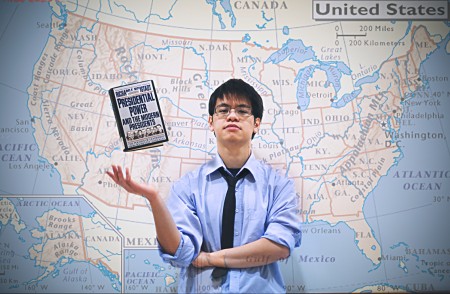Rejection knocks most people down, but when sophomore Peter Pham is on a mission, it is hard to tell him no.
Pham, an integrated studies major, spent months trying to get in touch with some of the most intelligent and respected professionals in the international relations field and was discouraged to learn that his phone calls and emails were largely ignored or fielded by secretaries.
So he decided to try something different. This past summer Pham took a road trip and visited his idols in person to convince them to come to Mason and speak to his Patriots for Foreign Service club. His trip covered ground between the University of Chicago, Princeton, Harvard and Yale.
Perseverance paid off, and Pham was able to convince Dr. Joseph Nye, the former dean of the Kennedy School at Harvard, a renowned political scientist to speak in Dewberry Hall at 9 a.m. on Feb. 6 to speak on the presidential advancement of American foreign policy in the twentieth century.
The event is open to the public and Pham encourages anyone with an interest in foreign service, despite their degree program, to attend.
“We are looking for people who want to work in foreign service, but the thing is, that’s all kinds of people,” Pham said. “Interest can come from any major, computer science, environmental science, engineering, really anything. They can help us go out to the other countries’ embassies to help with issues like the Peace Corps does.”
The accomplishment is monumental, as Dr. Nye typically attracts 5 or 6 figure speaking fees, many times the amount Pham and the Patriots for Foreign Service Club were able to offer. Despite the lack of funds, Dr. Nye agreed to take a trip from Massachusetts to Virginia to speak with the Mason community.
For international relations students, Dr. Nye is a celebrity in the field. International relations, at its most basic, is the study of relationships between countries and their different governing agencies.
“I really think that in the future, foreign policy and how the U.S. is standing in the world, is affected most strongly by our diplomacy, specifically soft power rather than military power or hard power,” Pham said.
Dr. Nye is the founder of the neo-liberalism school of thought and has been an advisor to several presidents. Dr. Nye will discuss his new book “Presidential Leadership and the Creation of the American Era” and the implications of ethics and effectiveness of select foreign policy decisions from the twentieth century.
Soft power is a term coined by guest speaker Dr. Nye as a concept of achieving a means through coercion instead of war or payment. The concept has become widely used in the international relations field and helped shape the global policy of the Obama administration, particularly during the 2011 Arab Spring.
After the lecture there will be a debate between nationally-ranked Pham and students from Duke and Princeton University on a resolution to urge the president to normalize U.S. and Cuban relations by ending sanctions and offering unconditional econ omic assistance. The debate will be moderated and judged by Dr. Nye.
Dr. Nye will be speaking as part of a lecture series titled the Christopher Stephens project, in honor of the American diplomat who lost his life in the Benghazi attacks. The series is co-hosted by the provost, the dean of the college of humanities and social sciences and university life.







Comments